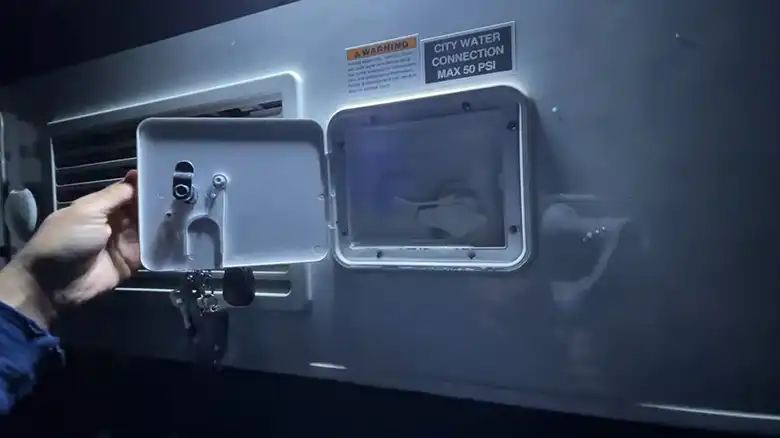Having a working RV battery is key for powering all those handy gadgets and appliances in a recreational vehicle. But like anything, batteries wear down over time. Taking good care of them makes RV batteries stay strong for many years. This saves money too since brand-new batteries can be pricey.
Keeping batteries working their best is not difficult. Small steps like checking water levels or cleaning off dirt buildup make a difference. Even just watching for signs of a struggling battery can help catch issues early. Addressing them quickly can get things running properly again.
This article reveals the easiest ways for RV owners to keep their batteries going and going. Following basic maintenance tips will be rewarded with a longer lifespan from these important power sources. A well-cared-for battery means more trips powered up with lights, a fridge, and everything else needed for comfortable travels.

Regular Maintenance Tips for RV Batteries
An RV battery provides all the power you need for lights, appliances, entertainment systems, and more when you are disconnected from utilities. Taking good care of your battery will allow it to optimally do its job powering your RV.
A. Check Water/Electrolyte Levels (for Flooded Lead-Acid Batteries): For flooded lead-acid batteries, periodically check that the water/electrolyte levels are correct and refill with distilled water as needed. Low electrolyte levels can damage batteries.
B. Clean Battery Terminals and Connections: Clean off any dirt, oxidation, or grease that builds up on the battery terminals and cable connections using a wire brush or baking soda solution. This prevents resistance which can hinder performance.
C. Check for Corrosion on Terminals: Examine terminals closely for signs of corrosion and replace them as needed. Corrosion interrupts the battery flow and can completely stop a battery from working properly.
D. Check Charge Levels: Using a voltmeter, regularly check that your batteries are charged up to the proper levels. Top-up charging as needed to keep them operating at peak efficiency.
E. Equalize Batteries Occasionally (for Lead-Acid)For flooded lead-acid batteries, equalize the batteries every few months by charging up to a higher voltage to avoid sulfation buildup which shortens battery life.
F. Monitor Batteries for Swelling/Leaking: Examine batteries for any swelling or leaking which are signs of failure/damage and replace them as soon as possible.
How to Ensure Proper Charging and Discharging of RV Batteries
Properly charging and discharging your RV battery is crucial to maximizing its lifespan and ensuring it can adequately power your RV when off-grid. Follow some simple guidelines to get the most out of your RV battery.
A. Charge After Each Use: Recharge batteries fully after every trip before storing your RV. Letting batteries sit for long periods while discharged damages them over time.
B. Use Proper Charger Settings: Choose the right charger settings aligned with your battery type – wet cell, lithium, etc. The optimal voltage levels vary between chemistry types. Charging incorrectly can reduce battery capacity.
C. Avoid Excessive Discharging: Don’t allow batteries to discharge completely to zero charge. Deep discharging too often shortens battery life. Ideally, keep charge levels 50-100%.
D. Don’t Leave Batteries Discharged: Don’t store batteries in a low/discharged state for extended times. Self-discharge increases the lower the charge level and can render them unusable.
How to Store and Winterize Your RV Battery?
Properly storing your RV battery, especially during colder months, is vital to ensuring it stays in good health for many seasons. Take a few key steps when putting your battery away for storage or winter.
A. Store Batteries Properly: When storing RV batteries, place them on a wooden pallet or other non-conductive, dry surface in a cool, dry, well-ventilated area.
B. Charge Batteries Before Winter Storage: Make sure to fully charge batteries before putting them away for the winter. Topping up to 100% charge minimizes sulfation buildup.
C. Keep Batteries off Concrete Floors: For winter specifically, do not leave batteries sitting directly on cold concrete floors. Place wood or an insulator underneath them.
D. Consider Battery Heaters and Dehumidifiers: To batteries healthy over winter, use a storage heater and dehumidifier which protects against capacity loss.
RV Battery Types and Their Average Lifespan
An RV relies heavily on its batteries when camping or dry docking without external power source access. Understanding the expected lifespan for your battery type allows better planning for eventual replacement. Proper care and handling can extend the working years of whatever system your RV uses.
Types of RV Batteries
There are three primary battery types used for RV applications:
Flooded Lead-Acid: This inexpensive option is sufficient for most needs. Requires water refilling maintenance. Lasts 2-6 years typically.
Absorbed Glass Mat (AGM): No water refills are needed. More expensive but longer lifespan of 6-8 years.
Lithium-Ion: The most expensive, lightest weight, and longest-lived option lasting 8-15 years. Requires advanced charge/discharge management.
Increasing RV Battery Lifespan
You can extend the usable service life of your RV batteries by:
- Properly sizing your battery bank capacity.
- Using a sophisticated charge controller.
- Actively monitoring voltage and refraining from excessive discharge depths.
- Ensuring batteries are fully recharged after each trip.
- Performing regular maintenance.
Following manufacturer charging protocols and storing batteries properly, especially winterizing, also prevents premature failure.
Common RV Battery Issues and Troubleshooting
The sensitive chemical processes in RV batteries can be disrupted by numerous problems. Catching and correcting small issues early prevents more serious, irreversible failures. Know what to look for and steps to try bringing batteries back to full power.
Common RV Battery Issues
Sulfation: Lead sulfate crystal buildup on plates blocking electrical current, caused by undercharging. Significantly reduces capacity if left unchecked.
Stratification: Density differences between electrolyte layers caused by inconsistent charging. Decreases electrolyte mix efficiency.
Corrosion: Oxidation on the battery terminals interrupts electrical flow. Leads to connection issues.
Undercharged: Not fully recharging after each trip causes progressive damage over time to plates and electrolyte balance.
Troubleshooting Tips
Sulfation- Use an equalization charger to reverse crystal buildup. Always fully charge batteries after each use.
Stratification- Use a proper 3-stage smart charger, and equalize flooded batteries periodically. Check electrolyte levels.
Corrosion- Clean terminals and battery trays regularly using a wire brush and baking soda solution to remove oxidation.
Undercharged- Invest in a quality battery monitor system. Don’t let batteries sit discharged for extended durations. Charge back to 100% after every trip.
When to Upgrade Your RV Battery
Determining if your current RV battery needs replacement or could eke out more time with TLC takes weighing several key factors. Periodic maintenance helps maximize lifespan, but upgrades eventually become necessary. Moving on from tired batteries to advanced new ones opens new off-grid adventures.
Signs It’s Time for Replacement
Key indicators your battery is near or has reached, the end of its useful life include:
- Failing to hold a charge for as long as when newer.
- Need to recharge more frequently.
- Corroded terminals were unable to be fully cleaned.
- Cracked case.
- Freezing, bulging, or extreme overheating.
Considerations Before Upgrading
Before swapping in new batteries:
- Calculate costs against expected years of use.
- Determine if maintenance or a charger upgrade could extend the current battery life.
- Ensure chosen replacement batteries suit your RV power needs.
When You Should Replace Your RV Battery
As batteries near the end of their lifespan, their storage capacity and charge length begin to decline. Upgrading before they fail restores your freedom to roam off-grid worry-free.
Signs Batteries Are Nearing End of Lifespan
- Failing to hold charge as long
- Needing more frequent charging
- Corroded terminals that can’t be cleaned
- Bulges, cracks, or leaks in the case
Cost/Benefit Analysis of Replacement vs. Maintenance
- Calculate replacement cost vs expected years of use
- Determine if maintenance could stretch lifespan further
- Ensure new batteries meet your RV power needs
Additional Tips for Prolonged Battery Life
Careful monitoring and more efficient usage let RV batteries last many seasons powering all your off-grid adventures and creature comforts.
- Install a battery monitoring system
- Use energy-efficient appliances
- Practice conservative power consumption
How to Dispose of Old Batteries Properly
Most areas have recycling programs accepting expired batteries. Proper handling for transportation prevents leaks or terminal shorts while awaiting recycling.
- Locate recycling centers for lead-acid/lithium batteries
- Prepare batteries for safe transport to facilities
Conclusion
Taking proper care of RV batteries is key to keeping them working their best for many years. Simple maintenance like checking fluid levels, cleaning terminals, avoiding over-discharging, recharging fully, and monitoring charge lengths pays back with longer lifespan, better performance, and less money wasted on replacements. Treat batteries right and they’ll keep powering those off-grid journeys.


